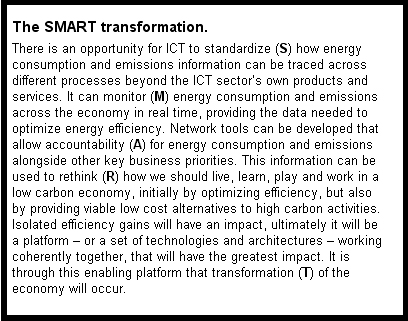The figures and most of the facts in this article are taken from “SMART 2020: Enabling the low carbon economy in the information age”, an interesting and very informative report created by The Climate Group on behalf of the Global eSustainability Group (www.smart2020.org). SMART stands for Standardize, Monitor, Account, Rethink and Transform (see sidebar), while 2020 refers to the emission target of a 20% reduction of 1990 levels by 2020.
Communications (remember that it’s the C in ICT) will play various roles in the various SMART sectors, but the baseline function is the fact that in most cases information on energy consumption needs to be communicated in order to be effective. For example, smart metering is an initiative that Alcatel-Lucent (News - Alert) and Bell Labs are addressing whereby regulators and electric utilities can use to shape future electricity demand. It will allow operators to educate and motivate consumers to be more prudent and proactive about their energy usage. In addition, there is a consensus that the U.S.’s national electric grid is a hodge-podge in need of complete updating in regard to supply, interconnection of systems, intelligent communications and date interchange between service providers. These are just two examples from one industry and there are many more.

Direct impact and indirect benefits
ICT itself is relatively energy efficient. In 2007 analyst Gartner (News - Alert) released the statistic that the ICT sector was responsible for 2 percent of global carbon emissions and this figure has since been widely cited. Improvements are always possible and they will be covered in these articles, e.g. a 70 percent reduction in the energy consumption of base stations. The total indirect benefits are close to 50 percent according to Alcatel-Lucent.
These benefits will accrue in areas such as: virtual healthcare, energy management, smart logistics / transport, virtual education, flexi working, audio / video teleconferencing, and B2B / B2C Internet commerce. In a nutshell, ICT’s largest influence will be enabling energy efficiencies in other sectors.
The current 25:1 discrepancy does not mean that the ICT industry should not take its own medicine and go on to use the results as a marketing tool.
Telecommunication vendors such as Alcatel-Lucent, Ericsson and Nokia Siemens (News - Alert) Networks are promoting their green credentials and the key message is the fact that energy-efficient technologies have a positive impact on the carrier’s bottom line and this enables the delivery of cheaper, better audio and video services. And when the economy picks up, one can expect investors to choose companies that employ sustainable practices and produce energy-efficient products.
Bob Emmerson is TMC's (News - Alert) European Editor. To stay abreast of the latest news affecting the European market, check out Bob's columnist page.
Edited by Stefania Viscusi
 Internet Telephony Magazine
Click here to read latest issue
Internet Telephony Magazine
Click here to read latest issue CUSTOMER
CUSTOMER  Cloud Computing Magazine
Click here to read latest issue
Cloud Computing Magazine
Click here to read latest issue IoT EVOLUTION MAGAZINE
IoT EVOLUTION MAGAZINE




